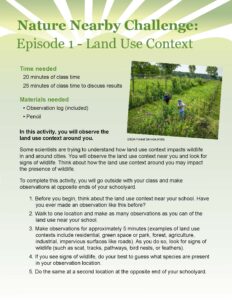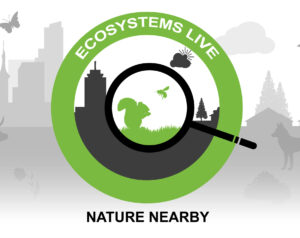Ecosystems LIVE Episode 1 – Activity – Land Use Context

SHARE
After watching episode 1 of Ecosystems LIVE about human impacts on mammals, you can try this Nature Nearby Challenge.
In this activity, you will observe the land use context around you by going outside and making observations at opposite ends of your schoolyard, yard, park, or other safe outdoor area.
Materials:
- Observation log (included)
- Pencil or other writing utensil

SHARE
Standards addressed in this Activity:
Next Generation Science Standards
The Next Generation Science Standards (NGSS) are a set of K-12 science education standards emphasizing inquiry-based learning, real-world applications, and integrating engineering practices, aiming to deepen understanding of science while promoting critical thinking and problem-solving skills.
- ESS3.C-M1Human activities have significantly altered the biosphere, sometimes damaging or destroying natural habitats and causing the extinction of other species. But changes to Earth’s environments can have different impacts (negative and positive) for different living things.
- LS2.A-M1Organisms, and populations of organisms, are dependent on their environmental interactions both with other living things and with nonliving factors.
- LS2.A-M4Similarly, predatory interactions may reduce the number of organisms or eliminate whole populations of organisms. Mutually beneficial interactions, in contrast, may become so interdependent that each organism requires the other for survival. Although the species involved in these competitive, predatory, and mutually beneficial interactions vary across ecosystems, the patterns of interactions of organisms with their environments, both living and nonliving, are shared.
- LS2.C-M1Ecosystems are dynamic in nature; their characteristics can vary over time. Disruptions to any physical or biological component of an ecosystem can lead to shifts in all its populations.
Social Studies Standards
Social Studies Standards are educational guidelines outlining the essential knowledge, skills, and concepts students should learn in subjects such as history, geography, civics, and economics, aiming to provide a comprehensive understanding of societal structures, historical events, and global perspectives.
- People, Places, and Environments





